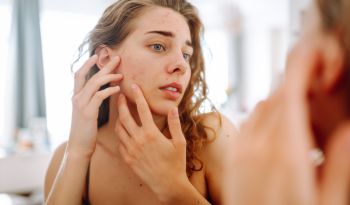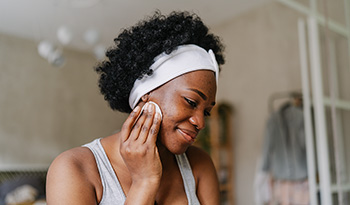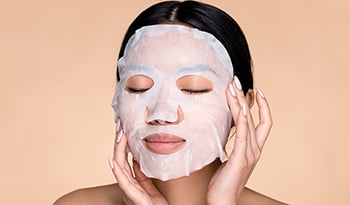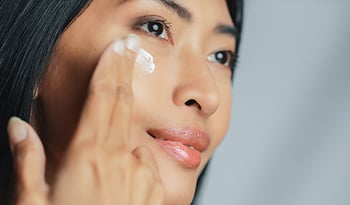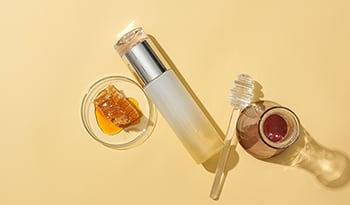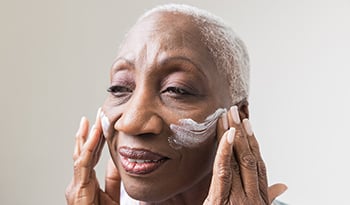A Dermatologist’s Tips for Managing Eczema Naturally

Eczema is a common, chronic, inflammatory skin condition. One in 10 people will develop eczema in their lifetime. When the skin is affected, it will be itchy, red, scaly and dry. Infection can occur from breakage of the skin due to scratching. Eczema can occur at any age, but most commonly starts in childhood.
What Are the Different Types of Eczema?
- Atopic dermatitis is the most common form of eczema. This usually starts during infancy, while other forms can develop in adulthood. Atopic dermatitis is often associated with seasonal allergies and asthma, and will often run in the family.
- Seborrheic dermatitis is another common type and manifests as dandruff or cradle cap. Additionally, it can involve the face, ears, body and private areas.
- Contact dermatitis is another form where individuals can develop inflammation and rash in response to particular products or chemicals.
- Hand eczema is another variant that can be very debilitating and often challenging to treat. It often starts off with extremely itchy bumps on the fingers and palms, and sometimes the feet are also affected. These bumps will often turn into blisters when scratched and then break open, leading to open sores and crusting. When the feet are involved, it can be painful to walk.
- Nummular, or coin-shaped, rashes tend to involve the arms and legs. This is more commonly seen during the winter and in adults or elderly individuals as skin tends to dry out on the extremities with age.
What Causes Eczema?
The causes of eczema include both genetic and environmental factors. Individuals prone to eczema have often inherited the genetic propensity for dry skin. Our skin acts as a protective barrier: keeping water in, and bad things like allergens and bacteria out. When our skin dries out, it is unable to provide adequate barrier function. Microtrauma to the skin then leads to inflammation, causing itching and rash.
Eczema is more common during the winter when the weather is dry and cold. Stress also plays a major role in flaring eczema. Other common triggers include heat, sweat, and scratchy clothing. Individuals with dry skin are also more sensitive to fragrances and preservatives in skin care products and hence more likely develop contact dermatitis.
How Can I Treat Eczema Naturally at Home?
Eczema will often come and go, therefore it is important to develop healthy skin care habits. Since the root cause is dry skin, daily gentle skin care is key for preventing eczema.
Daily showers or baths are recommended, but keep water contact time to 10 minutes or less and avoid hot water as it will dry out skin. Limit soap only to the armpits and private areas. We do not need soap everywhere, which can strip our skin’s natural oil. After the shower, gently towel dry by patting and avoid rubbing or scrubbing. While your skin is still damp, apply a heavy-duty moisturizer from head to toe.
What Products Should I Use for Eczema?
In general, stick to products that are fragrance- and preservative-free. When showering, avoid products that are foaming, and instead look for soaps specifically formulated for eczema or sensitive skin. For the face, stick to gentle creamy cleansers or even cleansing lotions that are still effective at removing dirt and makeup but less harsh on the skin.
For moisturizers and emollients, usually thicker formulation or even ointment-based products are best at sealing in water on the skin. Ceramides are natural lipids that are often lacking in skin with eczema. Moisturizers containing ceramides are more effective at rebuilding the skin barrier. Also look for products specially formulated for sensitive or eczema-prone skin as these are usually fragrance-free and hypoallergenic.
Other Home and Lifestyle Tips for Dealing with Eczema
Limit the amount of scrubbing you do on your skin. The physical friction will create microtears in the skin, leading to eczema or flaring of preexisting rash. Wool and scratchy materials or fabric will predispose an individual to scratching. Instead stick to breathable cotton material for clothing.
For skin care, limit exfoliating to only a few times monthly. Be careful with retinol or alpha-hydroxy acid products. These tend to be more drying. If you are new to them, start when your skin is clear of dermatitis, and use only a few nights weekly and gradually increase to nightly as tolerated. Take a break from use if your eczema returns.
Itching tends to be more pronounced at night. Sleeping in a cooler temperature will minimize the propensity to itchy. Avoid heating blankets; the heat can exacerbate itching and also dry out your skin. Adding a bedside humidifier during winter months can add moisture back into your bedroom.
When the skin is very itchy, scratching will only beget more itch and rash. Instead, try colloidal oatmeal baths for 10-15 minutes to soothe dry skin and relieve itching. Cool compresses not only will soothe inflamed skin, but also distract from the sensation of itch.
For individuals prone to hand eczema, remember frequent hand washing can irritate the skin. Applying a hand cream immediately after each hand wash can help. Protecting the hands with rubber gloves prior to washing dishes or coming into contact with chemicals is also helpful.
Diet and Eczema
Diet and eczema is a controversial topic. There are no studies to date that have shown that certain foods will directly cause eczema. Individuals who have severe eczema and also have a strong history of seasonal allergies are more likely to develop food allergies, but the reactions are not the same immunologically.
Foods that one is allergic to should be avoided for the risk of anaphylaxis, but ingesting those foods may not necessarily cause eczema. Unless there is a clear association between eating a particular food and flaring of rash, food restriction is not recommended, especially for young kids and babies. Nevertheless, eating a well-balanced diet full of healthy fats and protein is generally good for the body. Avoiding pro-inflammatory foods such as those with a high glycemic index or highly processed foods can be helpful.
Clinically studies have shown that in individuals with eczema, taking a daily probiotic can lessen the severity of the disease. Fish oil, which is high in omega-3 fatty acids can help to rebuild the skin and fight inflammation.
When Should I See a Dermatologist for Eczema?
Eczema can often become infected by bacteria. See your dermatologist if your skin is painful, oozing and crusting, which may be signs of infection. In addition to testing and treating skin infection, your dermatologist can also prescribe topical medications to soothe inflamed skin. Ultimately, your dermatologist can provide additional tips and treatments when gentle skin care and home treatments have failed.
DISCLAIMER:This Wellness Hub does not intend to provide diagnosis...
















































































 Table of Contents
Table of Contents



